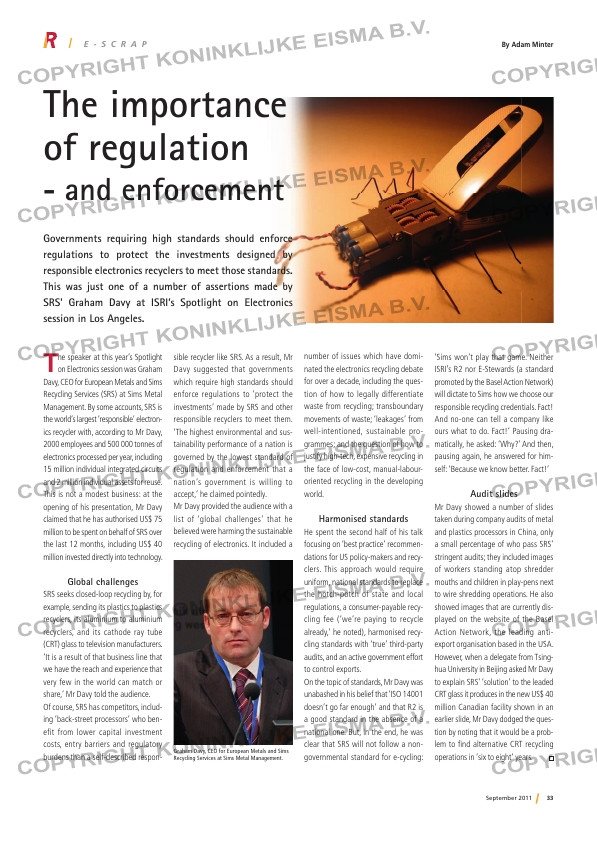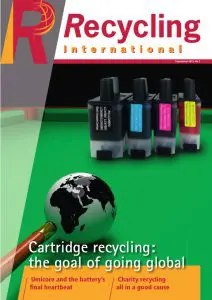Page 33 from: September 2011

33September 2011
E – S C R A P By Adam Minter
The importance
of regulation
– and enforcement
Governments requiring high standards should enforce
regulations to protect the investments designed by
responsible electronics recyclers to meet those standards.
This was just one of a number of assertions made by
SRS’ Graham Davy at ISRI’s Spotlight on Electronics
session in Los Angeles.
The speaker at this year’s Spotlight on Electronics session was Graham
Davy, CEO for European Metals and Sims
Recycling Services (SRS) at Sims Metal
Management. By some accounts, SRS is
the world’s largest ‘responsible’ electron-
ics recycler with, according to Mr Davy,
2000 employees and 500 000 tonnes of
electronics processed per year, including
15 million individual integrated circuits
and 2 million individual assets for reuse.
This is not a modest business: at the
opening of his presentation, Mr Davy
claimed that he has authorised US$ 75
million to be spent on behalf of SRS over
the last 12 months, including US$ 40
million invested directly into technology.
Global challenges
SRS seeks closed-loop recycling by, for
example, sending its plastics to plastics
recyclers, its aluminium to aluminium
recyclers, and its cathode ray tube
(CRT) glass to television manufacturers.
‘It is a result of that business line that
we have the reach and experience that
very few in the world can match or
share,’ Mr Davy told the audience.
Of course, SRS has competitors, includ-
ing ‘back-street processors’ who ben-
efit from lower capital investment
costs, entry barriers and regulatory
burdens than a self-described respon-
sible recycler like SRS. As a result, Mr
Davy suggested that governments
which require high standards should
enforce regulations to ‘protect the
investments’ made by SRS and other
responsible recyclers to meet them.
‘The highest environmental and sus-
tainability performance of a nation is
governed by the lowest standard of
regulation and enforcement that a
nation’s government is willing to
accept,’ he claimed pointedly.
Mr Davy provided the audience with a
list of ‘global challenges’ that he
believed were harming the sustainable
recycling of electronics. It included a
number of issues which have domi-
nated the electronics recycling debate
for over a decade, including the ques-
tion of how to legally differentiate
waste from recycling; transboundary
movements of waste; ‘leakages’ from
well-intentioned, sustainable pro-
grammes; and the question of how to
justify high-tech, expensive recycling in
the face of low-cost, manual-labour-
oriented recycling in the developing
world.
Harmonised standards
He spent the second half of his talk
focusing on ‘best practice’ recommen-
dations for US policy-makers and recy-
clers. This approach would require
uniform, national standards to replace
the hotch-potch of state and local
regulations, a consumer-payable recy-
cling fee (‘we’re paying to recycle
already,’ he noted), harmonised recy-
cling standards with ‘true’ third-party
audits, and an active government effort
to control exports.
On the topic of standards, Mr Davy was
unabashed in his belief that ‘ISO 14001
doesn’t go far enough’ and that R2 is
a good standard in the absence of a
national one. But, in the end, he was
clear that SRS will not follow a non-
governmental standard for e-cycling:
‘Sims won’t play that game. Neither
ISRI’s R2 nor E-Stewards (a standard
promoted by the Basel Action Network)
will dictate to Sims how we choose our
responsible recycling credentials. Fact!
And no-one can tell a company like
ours what to do. Fact!’ Pausing dra-
matically, he asked: ‘Why?’ And then,
pausing again, he answered for him-
self: ‘Because we know better. Fact!’
Audit slides
Mr Davy showed a number of slides
taken during company audits of metal
and plastics processors in China, only
a small percentage of who pass SRS’
stringent audits; they included images
of workers standing atop shredder
mouths and children in play-pens next
to wire shredding operations. He also
showed images that are currently dis-
played on the website of the Basel
Action Network, the leading anti-
export organisation based in the USA.
However, when a delegate from Tsing-
hua University in Beijing asked Mr Davy
to explain SRS’ ‘solution’ to the leaded
CRT glass it produces in the new US$ 40
million Canadian facility shown in an
earlier slide, Mr Davy dodged the ques-
tion by noting that it would be a prob-
lem to fi nd alternative CRT recycling
operations in ‘six to eight’ years.
Graham Davy, CEO for European Metals and Sims
Recycling Services at Sims Metal Management.
033 l o s 33 13-0 -11 10:12



